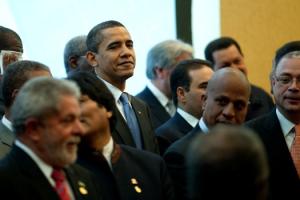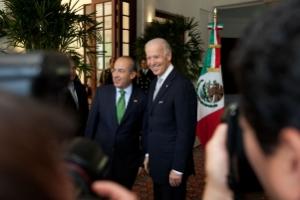In just a couple of days, President Obama will fly to Cartagena, Colombia, to attend this weekend's Organization of American States (OAS) Sixth Summit of the Americas. He and the US delegation are going to get an earful of criticism of US drug policies from Latin American leaders, and that makes it an historic occasion. For the first time, alternatives to drug prohibition are going to be on the agenda at a gathering of hemispheric heads of state.

group photo at 2009 Summit of the Americas (whitehouse.gov)
It's been building for some time now. More than a decade ago, Uruguayan President Jorge
Batlle became the first Latin American sitting head of state to call for a discussion of drug legalization. Former Mexican President Vicente Fox joined the call, albeit only briefly while still in office through some media quotes, much more frequently after leaving office in 2006. Honduran President Manuel
Zelaya issued a similar call in 2008, but didn't move on it before being overthrown in a coup the following year.
Meanwhile, drug prohibition-related violence in Mexico exploded in the years since President Felipe Calderon called out the army after taking office in December 2006. As the savagery of the multi-sided Mexican drug wars intensified and the death toll accelerated, surpassing 50,000 by the end of last year, the call for another path grew ever louder and more insistent.
In 2009, a group of very prominent Latin American political leaders and public intellectuals led by former Brazilian President
Henrique Cardoso, former Colombian President Cesar
Gaviria, and former Mexican President Ernesto
Zedillo formed the
Latin American Commission on Drugs and Democracy, calling for a fundamental reexamination of drug policy in the hemisphere and a discussion of alternatives, including decriminalization and regulation of black markets. That was followed last year by the
Global Commission on Drug Policy, which includes the Latin American ex-presidents, as well as former Switzerland President Ruth
Dreiffus and other prominent citizens such as Richard Branson and former UN Secretary General
Kofi Annan, echoing the Latin American Commission's call for reform.
As the commissions issued their reports, the violence in Mexico not only worsened, it spread south into Central America, where governments were weaker, poverty more endemic, and violent street gangs already well-entrenched. Guatemala, Honduras, and El Salvador, in particular, saw homicide rates soar in recent years, well beyond Mexico's, as the Mexican cartels moved into the region, a key transit point on the cocaine trail from South America to the insatiable consumers of the north.
Colombian President Juan Manuel Santos, the secretary of defense under his predecessor, Alvaro
Uribe, and a man who knows well just what a sustained war on drugs can and cannot achieve, has been among the latest to pick up the torch of drug reform. Santos has made repeated statements in favor of putting alternatives to prohibition on the table, although he has been careful to say Colombia doesn't want to go it alone, and now he has been joined by another unlikely reformer, Guatemalan President Otto Perez Molina, a rightist former general who campaigned on a tough on crime agenda.
It is Perez Molina who has been most active in recent weeks, calling for a Central American summit last month to discuss alternatives to drug prohibition ranging from decriminalization to regulated drug transit corridors to charging the US a "tax" on seized drugs. That summit saw two of his regional colleagues attend, Costa Rican President Laura Chinchilla and
Panamian President Ricardo
Martinelli, but no consensus was achieved, no declaration was issued, and three other regional leaders declined to show up. But that summit, too, was a first -- the first time Latin American leaders met specifically to discuss regional drug law reform.
All of this has not gone unnoticed by policymakers in Washington. Vice-President Biden, Homeland Security Secretary Napolitano, State Department functionaries and US military brass have all been flying south this year, reluctantly conceding that drug legalization may be a legitimate topic of debate, but that the US is having none of it.
"It's worth discussing," Biden told reporters in Mexico City last month. "But there's no possibility the Obama-Biden administration will change its policy on legalization. There are more problems with legalization than non-legalization."
But along with discussing an end to prohibition, the Latin Americans have also offered up proposals between the polar opposites of prohibition and legalization. Options discussed have included decriminalization of drug possession and marijuana legalization to different approaches to combating the drug trade to maintaining addicts with a regulated drug supply. In Colombia, Santos has sponsored legislation to decriminalize possession of "personal dose" quantities of drugs, restoring a policy mandated by the country's Constitutional Court but undone by a constitutional amendment under
President
Uribe.
And it's not just Latin American political leaders. The calls for change at the top are reflected in a civil society movement for drug reform that has been quietly percolating for years. In fact, an international, but mainly Latin American, group of non-governmental organizations this week issued an
Open Letter to the Presidents of the Americas calling for decriminalizing drug use and possession, alternatives to incarceration for non-serious drug offenses, a regulated market for marijuana, a public health approach to problematic drug use, alternative development, respect for traditional uses, and a more focused war on organized crime that is less broadly repressive than current models. In Mexico, a
social movement led by poet Javier Sicilia, whose son fell victim to cartel violence, has called for an end to the violence and pressed
Preident Calderon on drug reform.
After decades of US-imposed drug war, from US military operations in Bolivia in the
1980s to the multi-billion dollar Plan Colombia, with its counterinsurgency and aerial herbicide spraying, to the blood-stained Mexican border towns and the drug gang-ridden slums of Rio de Janeiro, Latin America is growing increasingly ready to strike out on a different path.
That's what awaits President Obama and the US delegation in Cartagena. The most vibrant discussions may well take place in hallways or behind closed doors, but the US is now faced with yawning cracks in its decades-long drug war consensus.

Joe Biden with Mexican Pres. Calderon last month (whitehouse.gov)
"It's very clear that we may be reaching a point of critical mass where a sufficient number of people are raising the questions of why not dialog on this issue, why not discuss it, why peremptorily dismiss it, why does the president laugh when the subject of drugs is brought up, is he so archly political that it becomes a sort of diabolical act to seriously discuss it, why isn't some new direction being ventured forth?" said Larry
Birns, executive director of the
Council on Hemispheric Affairs.
"It seems the public is approaching the point where it has become credible to say quite frankly that the drug war hasn't worked. The real menace to society is not so much legalization but the failure to confront the hard fact that after decades of effort and hundreds of billions of dollars, a successful prohibition strategy has not been created, nor is there any likelihood of it being created," he said.
"This is the first major gathering of heads of state at which alternatives to prohibitionist drug control policies, including decriminalization and legal regulation of currently illegal drugs, will be on the agenda," said Ethan
Nadelmann, head of the
Drug Policy Alliance. "Arguments that were articulated just five years ago primarily by intellectuals and activists, and three years ago by former presidents, are now being advanced, with growing sophistication and nuance, by current presidents. There is now, for the first time, a critical mass of support in the Americas that ensures that this burgeoning debate will no longer be suppressed."
"A lot of countries don't want to do the US's dirty work anymore -- enforcing the prohibitionist policies that are unenforceable and hypocritical," said Laura Carlson, director for Latin America rights and security in the Americas program at the
Center for International Policy. "Everybody knows that it's impossible to wipe out the illicit drug business without making it legal, and most people know that the efforts aimed at ostensibly doing that are not 100% honest and certainly not effective. Many Latin American countries don't want the degree of US intervention in their national security that the drug war entails either," she noted.
"Having said that, the US government is determined to put down any talk of alternatives and particularly alternatives that begin with regulation rather than prohibition. The recent visits of Napolitano, Biden, [US State Department Assistant Secretary for the Bureau of International Narcotics and Law Enforcement Affairs William]
Brownfield and the military leaders all carried that message," the Mexico City-based analyst continued. "Small and dependent countries -- El Salvador is the example here, after reversing its position on legalization -- are afraid to stand up to the US on this, and progressive countries don't seem to want to get involved, both because they find the issue a political hot potato and because they are focusing efforts on strengthening alternative organizations to the OAS."
"I think the US strategy of
Brownfield and the State Department will be to say that legalization was brought up and rejected by the Latin American leaders," offered
Sanho Tree, director of the
Drug Policy Project at the Institute for Policy Studies. "They will use dichotomous rhetoric, they will try to maneuver the discussion into either prohibition or heroin in vending machines, but this is about the whole spectrum of regulatory possibilities. That's what we need to be talking about instead of that
false dichotomy."
Still, to even deign to discuss policy alternatives to prohibition is a notable step forward for the US, even if it is only to dismiss them,
Nadelmann argued.
"The shift in the public posture of the US government -- from rejecting any discussion of legalization to acknowledging that 'it is a legitimate subject of debate' -- is significant, notwithstanding the clear caveat by the Obama administration that it remains firmly opposed to the notion," he noted. "That said, it is safe to assume that the US government will do all it can to suppress, ignore, distort and otherwise derail the emerging dialog. US officials are handicapped, however, by the remarkable failure of government agencies over the past thirty years to contemplate, much less evaluate, alternative drug control strategies. They also must contend with the fact that the United States has rapidly emerged -- at the level of civil society, public opinion and state government -- as a global leader in reform of marijuana policies."
The discussion on drug policy at Cartagena isn't taking place in a vacuum, and there is at least one other issue where the US finds itself at odds with its host and most of the region: Cuba. The US has once again insisted that Cuba not be allowed to attend the summit, and President Santos reluctantly acceded, but the whole affair leaves a sour taste in the mouth of Latin Americans. Ecuadorian President
Correa is not coming because of the snub, and the issue only plays into hemispheric discontent with Washington's war on drugs.
"The US won the day in persuading Santos not to invite Cuba," said
Birns, "but the political cost of that action is high, and the whole drug issue is twinned to it, not because Castro has an enlightened position on drugs, but because of anti-Americanism in the region. This means Cartagena is the city where a lethal blow against the status quo will be achieved."
"The United States is not going to listen," said
Birns, "but this era of non-discussion of drug legalization and refusal to countenance the possibility of dialog on the issue may be coming to an end. More and more people who aren't known as drug reform crusaders are coming forth and saying it's not working, that we need another approach, and that's probably decriminalization and legalization. We're very much closer to liberation on this issue than we've ever been before."
"Liberation" may now be within sight, but diplomatic dissent is not yet close to being translated into paradigmatic policy shifts. Whatever discussion does take place in Cartagena this weekend, don't expect any official breakthroughs or even declarations, said Carlson.
"I am not optimistic about there being any formal commitment, or perhaps even mention, of legalization per se," she said. "The implementation group for the Sixth Summit is already working on the final declaration and it contains a section on 'Citizen Security and Transnational Organized Crime.' I think that as far as it will go is to state that transnational organized crime is a growing problem and that the nations of the Americas agree to work together, blah, blah, blah," she predicted.
"The United States will reiterate its 'shared responsibility' and commitment, but will not mention the need to change a failed model," Carlson said. "There will be more rhetorical emphasis on social programs for 'resilient communities' and especially on police and judicial reform, although the former will not be reflected in what are largely military and police budgets. I think the best we can hope would be a mandate for a policy review and a commitment to continue to discuss alternatives. The specific proposals to legalize transit, to create a regional court for organized crime cases and US payment for interdictions will not likely be resolved."
"This is a long process, not an immediate objective," said Tree. "In Central America, it's going to take a year or two of thoughtful -- not sensational -- media coverage. When people see anarchy, they want order. With a more thoughtful dialog, we can begin to get traction."
"It is too soon to predict that this Summit of the Americas represents any sort of tipping point in global or even regional drug control policy,"
Nadelmann summed up. "But the odds are good that this gathering will one day be viewed as a pivotal moment in the transformation from the failed global drug prohibition regime of the twentieth century to a new 21
st century global drug control regime better grounded in science, health, fiscal prudence and human rights."
We'll see what happens this weekend, but at the very least, the taboo on serious discussion of reforming the drug prohibition regime at the highest levels has been shattered. Look for a report on the summit itself next week.
back to top

DEA agents raiding
Dear StoptheDrugWar.org supporter:
In 2008, candidate Barack Obama pledged to respect the right of state and local governments to provide access to medical marijuana for patients, a policy the Dept. of Justice under President Obama and Attorney General Eric Holder later put in writing. As you likely know by now, the Dept. of Justice under Obama and Holder has not lived up to that promise, but instead has engaged in a campaign of raids, intimidation and misinformation. Last week, rogue US Attorney Melinda Haag went even further over the top, not only raiding alleged medical marijuana locations in the famous "
Oaksterdam" neighborhood, but even attacking institutions like
Oaksterdam University and the Oaksterdam Cannabis Museum that don't distribute marijuana.
I'm writing today to ask you three small things:
- Sign Oaksterdam founder Richard Lee's change.org petition.
- Send a letter to President Obama through StoptheDrugWar.org. This is important so we know who on our list is motivated to help save medical marijuana and what Congressional and state legislative districts you live in.
- Pledge to stay tuned to our web site and email list for further actions needed in the campaign to save medical marijuana.
We are dismayed that the Justice Department has flouted the promise President Obama and Attorney General Holder made to patients and their states and cities. But we are unbowed, and we are fighting back -- because time and the truth are on our side. Thank you for your support at this critical moment.
Sincerely,

David Borden, Executive Director
StoptheDrugWar.org
Washington, DC
http://stopthedrugwar.org
P.S. Help StoptheDrugwar.org fight to save medical marijuana with a generous donation for our work. Feel free to select one of the books, videos or StoptheDrugWar.org gift items that we currently offer when you do.
back to top
The federal offensive against dispensaries in California and Colorado continues, even as more state legislatures take up medical marijuana.
California
Last Wednesday,
the Larkspur city council approved a moratorium on dispensaries. A 45-day moratorium passed on a 4-0 vote and could be renewed for up to a year. The city has banned dispensaries since 1997, but city staff warned that given recent state appeals court rulings, its ban could be unlawful, so it opted for the moratorium as a fall-back.
On Friday,
San Francisco Mayor Ed Lee issued a statement in support of safe access to medical marijuana. He said he was "concerned about recent federal actions" targeting dispensaries and agreed that federal raids should not be occurring. The notoriously controversy-averse mayor was prodded to speak out by
Americans for Safe Access, which earlier last week had mobilized a majority of the city's board of supervisors to publicly state their support.
Also on Friday,
Oaksterdam University founder Richard Lee said he will give up ownership of his medical marijuana-related businesses. The move came days after
Oaksterdam and related businesses were raided by DEA agents, as well as the IRS and US marshals.
Oaksterdam University will shut down at its current location at the end of the month and will try to reopen in a smaller, more affordable location, said Dale Sky Jones, the school's executive director and prospective owner. Lee said he thought he was being investigated for tax offenses. His Blue Sky dispensary was audited in 2010, and the IRS determined that it was not eligible to deduct standard business expenses, resulting in a substantial penalty.
As of Monday,
three San Francisco dispensaries targeted by the feds were still open despite a federal demand that they close by last Friday. The three dispensaries and their landlords were targeted for being too close to schools. Five other dispensaries in the city that were targeted earlier have shut down, but for now, at least,
HopeNet, 208 Valencia, and Mission Caregivers are still in business.
On Monday,
a zero-tolerance drugged driving bill was amended to no longer apply just to marijuana, but to any non-medical use of controlled substances. Because the bill's language says it will not apply "when the controlled substance was administered, dispensed, or prescribed by a person licensed by the state to administer, dispense, or prescribe controlled substances," medical marijuana users could still be subject to arrest since it cannot be prescribed.
As of Wednesday,
Americans for Safe Access lists five bills related to medical marijuana that are alive in Sacramento. Check the link to see the good, the bad, and the ugly.
Colorado
On Wednesday,
11 medical marijuana groups sent a letter to US Attorney John Walsh asking him "to respect these licensed businesses and the ailing
Coloradans they assist." The letter comes a week after Walsh sent out a second round of threat letters, this time targeting 25 dispensaries.
Maryland
On Monday,
the Maryland legislature adjourned without passing any medical marijuana bills. Both the Senate and House had passed bills that would have expanded the affirmative defense law for marijuana possession passed last year to include caregivers, but the session ended without both chambers passing the same bill. This after an earlier effort to create regulated access to medical marijuana was stifled by a veto threat from
Gov. Martin O'Malley (D).
Massachusetts
On Tuesday,
a pair of medical marijuana bills got a hearing before the Public Safety Committee. But after the hearing, the bills were "sent to study," which typically means the legislation is dead. That would open the way for voters to decide the issue for themselves in November. Backers of a ballot question on the issue need only 11,485 signatures by July 3 to make the ballot.
New Hampshire
On Tuesday,
a medical marijuana bill got a hearing before the House Health, Human Services and Elderly Affairs Committee. The bill,
Senate Bill 409, has already passed the Senate, but encountered familiar resistance from law enforcement officials, who doubted claims made about marijuana's medical benefits and raised concerns about crime associated with the drug. Sen. Jim Forsythe (
R-Strafford) told the panel he had met with
Gov. John Lynch last week and that Lynch was "looking the bill over." That could be a positive sign, given Lynch's previous threats to veto the legislation. The bill was referred to a subcommittee, which is expected to take up the bill next Tuesday.
New Jersey
Last Wednesday,
a patient filed a lawsuit against the state over delays in starting the state's medical marijuana program. Patient Richard
Caporusso alleges that
Gov. Chris Christie (R) and his administration have been implementing rules for medical marijuana distribution that are "designed with the intent" to thwart the program. New Jersey's law was passed in January 2010, but no dispensaries are yet open.
New York
On Monday,
Gov. Andrew Cuomo (D) put the kibosh on medical marijuana legislation pending in the Empire State. He said the issue should be reevaluated after more research has been conducted. "I understand the benefits. But there are also risks, and I think the risks outweigh the benefits at this point," he said, adding that there would not be time to debate any bill on the subject before the session ends in June.
Tennessee
Last Wednesday,
a medical marijuana bill died in the state legislature. Sponsor Rep. Jeanne Richardson (D-Memphis) withdrew the Safe Access to Medical Cannabis Act (
Senate Bill 251/House Bill 294) after a hearing in the House Health and Human Resources Committee. She said she will bring it back after the fall election campaign. The bill had surprisingly passed a Republican-led subcommittee earlier in the month, allowing the hearing to take place.
back to top
The Maryland General Assembly adjourned Monday night, but not before passing two bills that lighten up on marijuana possession. One bill, House Bill 350, reduces the penalty for possession of small amounts; the other, Senate Bill 422, makes marijuana possession a citeable offense.
Sponsored by Del. Luke
Clippinger (D-Baltimore) in the House and Sen. Jamie
Raskin (D-Montgomery County) in the Senate,
HB 350, lowers the penalty for possession of 10 grams or less of marijuana from up to a year in jail and a $1,000 fine to up to 90 days in jail and a $500 fine.
The bill originally would have reduced the penalty for possession of up to 14 grams (a half ounce), but was amended in the House to only seven grams. The 10 gram limit was a compromise reached in conference committee. The final version of the bill passed the House 91-32 and the Senate 40-5.
Introduced by Sen. Brian
Frosh (D-Montgomery County), SB 422 was written in response to a state court of appeals ruling that arrestees had a statutory right to counsel and a Public Defender analysis that the ruling would cost the state $28 million. The bill repeals the requirement and makes marijuana possession an offense chargeable by citation, meaning an officer can arrest someone for pot possession, but cannot jail him. The final version of the bill passed the House 81-58 and the Senate 45-0.
Both bills are now before
Gov. Martin O'Malley and are awaiting his signature.
back to top
In the opening move of its election season effort to pass Amendment 64, a marijuana legalization and regulation initiative, the Colorado Campaign to Regulate Marijuana Like Alcohol has put up a billboard in the heart of Denver featuring a nice, middle aged woman who says, "For many reasons, I prefer marijuana over alcohol" and asks "Does that make me a bad person?"

the first billboard in the Colorado campaign (CRMLA)
The billboard near Mile High Stadium sits above a liquor store. It went up last Thursday.
The
initiative, which takes the form of a constitutional amendment, legalizes the possession of up to an ounce of marijuana by adults 21 and over. Adults would also be able to possess up to six plants -- three mature -- and the fruits of their harvest.
It also calls for the licensing of marijuana cultivation facilities, product manufacturing facilities, testing facilities, and retail stores. It would require the legislature to pass an excise tax on the wholesale sale of marijuana and that the first $40 million in tax revenues each year be dedicated to the state's public school capital construction assistance fund. It would give local governments the ability to regulate such facilities or prohibit them.
In the most recent polling on the issue, a December
Public Policy Polling survey found that 49% supported the general notion of legalizing marijuana -- the poll did not ask specifically about Amendment 64 -- while 40% opposed it and 10% were undecided.
That shows that victory is within reach, but by no means assured. One of the key demographic groups needed to win is mothers and middle-aged women, like that nice lady on the billboard.
Colorado isn't the only state where marijuana legalization will be on the ballot. A similar effort in Washington has qualified for the ballot, while signature-gathering for initiatives continues in a number of states. Of those, efforts in Oregon and Montana now appear to have the best shot of actually qualifying for the ballot.
back to top
In an 8-1 decision last Thursday, the Washington state Supreme Court ruled that police must obtain a search warrant to search a vehicle even if they believe it contains evidence of the crime for which the person was arrested. The decision in State v. Snapp overturns the convictions of two men in unrelated but consolidated cases where police stopped drivers and then found drugs in their vehicles while searching them.
The ruling also extends the Washington state constitution's Fourth Amendment privacy protections beyond those granted to other US citizens under the current interpretation of federal constitutional law. In 2009, the US Supreme Court ruled in
Arizona v. Gant that such searches were permissible under the Fourth Amendment.
In
Gant, the court held that police must obtain a search warrant to search a vehicle, but allowed two exceptions: a limited search for weapons for officer safety and if the officer reasonably believed the vehicle contained evidence of the crime for which the person had been arrested.
While the Washington Supreme Court ruling found that the officer safety exemption already exists under the state constitution, it held that searches of a vehicle for evidence of the crime for which the person was already arrested is not allowed under Article I, Section 7 of the state constitution, which enumerates protections against illegal search and seizure under state law.
The near-unanimous decision came over the protests of prosecutors, who complained that making officers get search warrants to search a vehicle after arrest will take up too much time and would have other, unspecified impacts on law enforcement.
"These delays will only multiply if a warrant is required for every stop at 2:
00am on a Friday night in which the officer concludes it is reasonable to believe there is evidence of the crime of arrest in the vehicle," wrote James
Whisman, a senior deputy prosecutor with the King County Prosecutor's Office. "Scores of such arrests occur in any given jurisdiction in any 24-hour period."
But as the high court noted, while "a warrantless search of an automobile is permissible under the search incident to arrest exception when that search is necessary to preserve officer safety or prevent destruction or concealment of evidence of the crime of arrest," it had already "rejected the idea that the existence of probable cause alone can justify a warrantless search of a vehicle. While probable cause is a necessary condition for obtaining a warrant, it does not itself justify a search. Contrary to the urgency attending the search incident to arrest to preserve officer safety and prevent destruction or concealment of evidence, there is no similar necessity associated with a warrantless search based upon either a reasonable belief or probable cause to believe that evidence of the crime of arrest is in the vehicle."
In its opinion, the court clearly held that the rights of Washingtonians to be free of warrantless searches trump the right of law enforcement not to be inconvenienced.
Washington is not the only state where state courts have found rights in the state constitution beyond what the US Supreme Court has found in the US Constitution. In Alaska, for one example, the state courts have upheld the right of adults to possess limited amounts of marijuana in their homes. In Pennsylvania, in another example, the state courts have used state law to strike down school drug testing programs that had been okayed under federal Supreme Court jurisprudence.
back to top
The Dutch conservative coalition government has signaled since January that it intended to prohibit khat, the mild stimulant plant from the Horn of Africa, and now, indications are that the ban will happen soon. But the move is drawing heat from critics who charge it is based more on political considerations than hard science.

Yemeni chewing khat, 2009 (wikimedia.org)
The proposed
khat ban is of a piece with the center-right government's moves to restrict access to Holland's famed cannabis coffee shops -- it plans to ban foreigners from some border coffee shops as early as next month -- and its decision to treat hashish as a hard drug.
In Holland, which has seen increasing tension around issues of immigration and assimilation,
khat is used almost exclusively by the Somali immigrant community. The center-right government has argued that
khat use impedes Somalis' integration into Dutch society and that 10% of the Somali community is addicted to it.
A proposal to prohibit
khat awaits only a discussion -- no vote needed -- in parliament before it becomes law. While drug policy is typically handled by the Dutch justice and health ministries, the
khat ban is the initiative of migration and asylum affairs Minister
Gerd Leers.
"I'm involved in the ban because it appears to cause serious problems, particularly in the Somali community," he told Dutch radio in January. "They are lethargic and refuse to cooperate with the government or take responsibility for themselves or their families."
But according to the United Arab Emirates newspaper the
National, scientists disagree with Leers about
khat's impact and danger, and the Somali community, while cognizant of problems associated with
khat use, sees the move as immigrant bashing.
"There is a sense that it may be more symbolic for political reasons rather than aimed at improving our situation," said Mohamed
Elmi of
FSAN, the umbrella organization of Somali associations. "You can regulate or register or you can handle the problems with distribution in another way," he said. "The Somali community has many problems that need to be tackled and I don't see them doing anything about those."
Elmi scoffed at the government's assertion that 10% of the 25,000 Somalis in the country have a
khat problem, saying the number of
khat users is half that and "only a handful" are problem users.
Researchers at the Netherlands Institute for Mental Health and Addiction backed
Elmi's stand. They studied
khat use for the government and reported the number of problem
khat users as several hundred, but added that in many of those cases, in was
khat in combination with hard drugs or alcohol to blame.
"We made very different recommendations based on our study," said study coauthor Clary van
der Veen. "The large group of social users is not a problem. You may need to inform them better and point out the long-term effect, just like with smoking and drinking," she said. She also questioned whether a ban on
khat would truly help the integration of Somali immigrants. "In countries where
khat has been banned, the integration of Somalis is not faring better," she said.
The government's ban is also drawing criticism from the former head of the Dutch police union, Hans van
Duijn, who has become a prominent critic of both the Dutch government's "lurch to the right" and the war on drugs. That the idea of the ban is to help integrate Somalis was "nonsense," he said, as were government claims it was responding to pressure from other European countries where
khat is illegal.
"They are using a lot of misleading arguments, such as recently when the center-right argued for a ban on the sale of hashish because it was said to benefit North-African criminal gangs and the Taliban. As if by banning the sale of hashish in Dutch coffee shops this would end," he said.
And prohibition never works, anyway, van
Duijn noted. "The dealers will try hard to find a solution because they now stand to make more money, which will not benefit the user. It is a mystery to me what the benefits are."
back to top
A Jacksonville, Florida, narcotics detective shot and killed an armed man during a drug raid aimed at arresting a small-scale crack dealer last Thursday. Juan Montrice Lawrence, 40, becomes the 22nd person to die in US domestic drug law enforcement operations so far this year, and the third in a one-week period.
According to the Florida Times-Union, citing Jacksonville Sheriff's Office spokesman John Hartley, detectives had spent six weeks buying crack out of an apartment in the Casa del Rio St. Johns complex, and, after making one last purchase at the apartment door Thursday afternoon, a "take-down team" attempted to arrest their target, Nathaniel Phillip Hill, 39.
But Hill struggled, and the officers were pulled into the apartment as they took Hill to the floor. A second male, later identified as Hill's teen-age son, was also tackled. At that point, veteran narcotics Detective Valentino Demps saw Lawrence standing in a hallway with a gun in his hand. Demps ordered Lawrence to drop the gun, then shot him twice when he did not comply.
"He gave multiple commands for the suspect to drop the gun. He refused to obey the commands," Hartley said. "He was shot at least twice, once in the face, once in the hip."
Lawrence was taken to Shands Jacksonville Hospital, where he was pronounced dead.
Witnesses described seeing officers in black uniforms and ski masks gathered at the apartment complex.
By Friday, police had identified Lawrence as an "armed felon" whose previous convictions including carrying a concealed weapon and cocaine possession and were saying that the decision to shoot him had probably saved several officers' lives.
"If he'd let him get down that hallway, we could have three or four dead officers at the scene," Hartley said. "Certainly he [Lawrence] was ready to fire on them."
Nathaniel Hill was arrested and charges with distribution of cocaine and possession of a firearm by a convicted felon. An ounce of cocaine, a pistol, and rounds of ammunition were seized at the apartment. Hill's teenage son was detained, but later released without charges.
back to top
Two more people died last week in drug-related law enforcement actions, one in Colorado and one in Kentucky. The two men, an as yet unnamed Denver man and 46-year-old Brice Horne of Harned, Kentucky, become the 20th and 21st persons to die in US domestic drug law enforcement operations so far this year.
In the Colorado case, police told the Denver Post that a 35-year-old man was pulled over in an April 1traffic stop and then struggled with police before collapsing and dying.
He died after a "brief use of force" that was "very minor," Denver Police spokeswoman Raquel Lopez said. Force was used after the man became combative and tried to assault the officer, she said. He was then handcuffed and placed in the back of a patrol car, and shortly thereafter showed signs of "what appeared to be medical distress," she added.
The Office of the Medical Examiner reported that the man had "a large quantity of suspected narcotic" in his stomach.
"It appears one or more of the balloons burst or opened, releasing the content into the victim's system," Denver police said in a statement.
Denver police and the Denver District Attorney's Office are investigating.
In the Kentucky case, Kentucky State Police told media a Breckenridge County sheriff's deputy and a state police Drug Enforcement Special Investigations Task Force officer went to a Frankfort apartment last Tuesday morning to bust a methamphetamine lab.
Horne fled from the apartment and fled inside a nearby mobile home. The deputy didn't enter the mobile home, but the state agent did. Shots were fired and Horne was killed.
On Wednesday, police said the shooter was state police Detective Scott McMichael. They also said Horne confronted McMichael, threatened to kill himself, and fired his weapon before McMichael shot and killed him.
McMichael is on administrative leave pending an investigation.
back to top
More pain pill peddling, plus a pervy DARE officer, and a Hawaii cop with a medical marijuana card who was allegedly up to more than maintaining his own health. Let's get to it:
In Glasgow, West Virginia,
a Glasgow police officer was arrested last Thursday on charges he was peddling pain pills. Donald Scott Wills, 43, went down after an informant told police he had engaged in multiple drug transactions with Wills, and that Wills had bought drugs while in uniform and while in his police cruiser. Police set up surveillance of an area home, where the informant sold 30
oxycodone tablets to Wills, who gave him $30 and said he would pay the rest of the money for the pills once he got rid of them. He was then arrested on a single count of possession of a controlled substance with the intent to distribute.
In
Edwardsville, Illinois,
an Edwardsville Police DARE officer was arrested Monday on charges he was taking surreptitious videos of women undressing at a tanning salon. Officer Michael Collins, 46, went down after a customer at the tanning salon complained she saw him videotaping her with his cell phone over a wall as she prepared for a tanning session. Police confiscated his cell phone and found videos of at least two other women. Collins is charged with felony unauthorized video recording and has been suspended with pay by the department. He's free on his own recognizance.
In Honolulu,
a Honolulu police officer was arrested Tuesday on charges he was involved in a marijuana grow operation. Officer Michael Chu, 41, is facing federal marijuana possession, distribution, and cultivation charges. While Chu has a medical marijuana card, the feds allege that they uncovered a marijuana sales ring. They seized $12,000 in cash, about 20 pot plants, and found a pound of marijuana and several money orders in Chu's police car. The bust went down after
Fedex reported a suspicious package from California that turned out to contain eight clones.Last year, the DEA intercepted a package containing 14 pounds of marijuana that was destined for the same address.
In Rogersville, Arkansas,
a Hawkins County jail guard was arrested Tuesday on charges he was peddling pain pills. David Wayne "Big Time" Richards went down after the sheriff's office received a tip that he was involved in pill trafficking. Deputies used an informant to set up a drug buy, then pulled Richards over in a traffic stop. They seized 1,345 10-milligram
Lortab pills and $650 in cash. Richards was charged with possession of Schedule III narcotics with intent to deliver and as of Tuesday evening was being held on $100,000 bond pending arraignment May 2. He was fired from his jailer position, too. Richards is a well-known figure in the community, having served as an alderman in the town of
Surgoinville, but he is best known for dressing up as Santa Claus for an annual Christian motorcycle charity "Toy Run." He's looking at two to four years in prison.
back to top
April 14, 1989: A congressional subcommittee on Narcotics, Law Enforcement, and Foreign Policy, chaired by Sen. John Kerry (D-MA), issues a report finding that US efforts to combat drug trafficking were undermined by the Reagan administration's fear of jeopardizing its objectives in the Nicaraguan civil war. The report concludes that the administration ignored evidence of drug trafficking by the Contras and continued to provide them with aid.
April 13, 1995: The US Sentencing Commission votes to equalize penalties for crack and powder cocaine by equalizing quantities triggering mandatory trafficking and possession offenses, a proposal that would have become law on November 1 if Congress took no action. Attorney General Janet Reno urges Congress to reject it the next day.
April 15, 1998: California Superior Court Judge David Garcia orders Dennis
Peron, author of Proposition 215, to cease operations of his Cannabis Cultivators' Club (
CCC) in San Francisco. Judge Garcia writes, "The court finds
uncontradicted evidence in this record that defendant
Peron is currently engaging in illegal sales of marijuana." The illegal sales, the court said, were to "primary caregivers," not patients as defined by California's medical marijuana law.
Peron agrees to resign as head of the
CCC in an effort to keep the operation open.
April 16, 1998: The Iowa Legislature overwhelmingly approves a bill enhancing marijuana penalties for repeat offenders, and enabling police officers to conduct drug tests on drivers who appear to be operating under the influence of marijuana.
April 18, 2001: Kenneth Hayes and Michael Foley are acquitted by a Sonoma County, California jury on charges of cultivating and possessing marijuana. The two were arrested for growing 899 marijuana plants for the 1,200 members of a San Francisco medical marijuana club called CHAMP (Cannabis Helping Alleviate Medical Problems).
April 12, 2002: Canada's Toronto Sun reports that a recent study cites Ontario's indoor marijuana industry as the third largest agricultural sector in the province, a $1-billion industry surpassed only by dairy's $1.3 billion and beef cattle's $1.2 billion. Add to that the millions being harvested from outdoor crops and marijuana cultivation in this province moves into the top spot on the list.
April 17, 2002: While under the influence of amphetamines issued to them by the US government in order to stay awake during the mission, two US pilots mistakenly drop a bomb that kills four Canadian soldiers in Afghanistan. The Air Force-issued "go pills" may have impaired the pilots' judgment, says David Beck, lawyer for
Maj. William
Umbach, adding that the pilots were given antidepressants upon returning from their mission. "The Air Force has a problem. They have administered 'go pills' to soldiers that the manufacturers have stated affect performance and judgment," Beck said.
April 16, 2004: Richard
Paey, a wheelchair-bound pain patient, is sentenced to 25 years in prison by a Florida judge.
Paey, who was convicted of forging prescriptions for pills to ease chronic, severe back pain dating from failed surgeries after an auto accident in 1985, was sentenced under Florida law as a drug dealer -- though even prosecutors conceded there is no evidence he did anything other than consume the
opioid pain relievers himself. (
Paey is later pardoned by
Gov. Charlie
Crist.)
back to top












